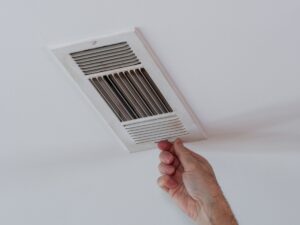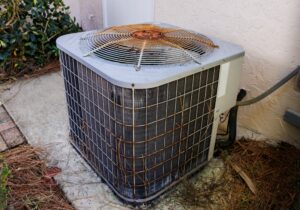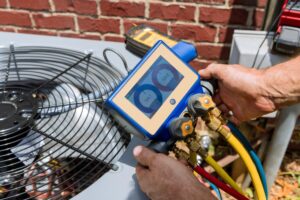Many homeowners believe that simply closing the air vents in unused or infrequently used rooms will help optimize temperatures and save energy throughout the rest of their homes. After all, if a room doesn’t need heating or cooling, why send air there, right? Unfortunately, while closing vents might seem like a great way to cut costs and manage airflow, it can backfire, leading to problems with your HVAC system and even increased costs.
Problems That Occur When You Close Air Vents
You might think that closing air vents in unused rooms saves energy and money, but the reality is quite different. Here are some of the issues that can arise when you completely close air vents:
Increased Air Pressure in the Ductwork
Your HVAC system is designed to distribute a specific amount of air through your home. When you close vents, the same amount of air is forced into fewer spaces, increasing air pressure inside the ductwork. This added pressure can cause your HVAC unit to work harder than necessary to push the air through the system, which not only leads to wear and tear on the equipment but can also cause leaks in the ductwork. As air escapes through these leaks, your system’s efficiency drops and your energy bills rise.
Reduced Energy Efficiency
Contrary to popular belief, closing vents in unused rooms doesn’t save energy. In fact, it has the opposite effect. When your HVAC system has to work harder due to increased air pressure, it uses more energy, which reduces the overall efficiency of the system. So, while you might think that closing the vents will save you money, it can actually result in higher energy bills over time.
Comfort Imbalances in Other Rooms
Closing vents doesn’t just affect the room you’re trying to limit airflow to; it can also create uncomfortable temperature differences throughout the rest of your home. Since your system isn’t distributing air evenly, some rooms may become too hot or too cold, making it harder to achieve the right temperature balance. So, if overall comfort is your goal, stop closing the air vents in your home!
Strain on Your HVAC System
When the air pressure increases and airflow becomes restricted, your HVAC system experiences more stress. The harder your air conditioner or furnace has to work, the quicker it will wear down. This can lead to premature repairs or even the need to replace your system sooner than expected. If you want to extend the lifespan of your HVAC system, it’s best to avoid closing air vents.
Mold and Mildew Growth
In rooms with closed vents, the lack of air circulation can lead to increased humidity levels, creating an environment conducive to mold and mildew growth.
Is It Okay to Partially Close Vents?
You might be thinking, “If closing vents completely is a bad idea, can I partially close them?” The answer is: you can, but it’s still not ideal.
Partially closing vents can help redirect some airflow to other areas of your home without causing as dramatic an increase in air pressure as fully closed vents. However, it still disrupts the balance of your HVAC system and can lead to many of the same issues mentioned above, albeit to a lesser degree.
If you do choose to partially close vents, it’s important to do so minimally and monitor your system closely for any signs of stress or reduced efficiency. Remember, your HVAC system was designed to work with all vents open, so any adjustment to this can impact its performance.
What’s a Better Way to Control Indoor Temperatures & Improve HVAC Efficiency?
Instead of closing air vents, consider these more effective strategies for managing your home’s climate and improving energy efficiency:
- Utilize HVAC Zoning: A zoned HVAC system divides your home into different areas, each with its own thermostat. This allows for precise temperature control, ensuring that you’re not wasting energy on unused rooms while maintaining comfort in occupied spaces. HVAC zoning is an excellent long-term solution for homes with varying temperature needs in different areas.
- Use Smart Thermostats: Upgrading to a smart thermostat can greatly improve your ability to manage your home’s heating and cooling. These thermostats learn your habits and automatically adjust the temperature based on your preferences and when rooms are in use. Some smart thermostats also allow you to control different zones or areas of your home from a single device, making it easy to manage comfort in every room without closing vents.
- Schedule Regular Maintenance: One of the simplest ways to improve energy efficiency is by scheduling regular air conditioning maintenance. Ensuring that your system is clean, well-maintained, and working efficiently can prevent many common problems that cause it to work harder than necessary. Simply sign up for an HVAC maintenance plan and never forget about an appointment again!
- Check Your Insulation: Make sure your home is well-insulated, particularly in the attic and around windows and doors. Good insulation helps maintain desired temperatures, reducing the workload on your HVAC system.
- Use Fans: Ceiling fans and portable fans can help circulate air and create a wind-chill effect, making rooms feel cooler without having to lower the thermostat.
By implementing these strategies, you can achieve better temperature control and improved energy efficiency without resorting to closing floor or wall vents.
Choose H.J. Faust for Expert HVAC Solutions
While closing air vents may seem like a simple way to control temperatures and save energy, it often leads to increased strain on your HVAC system, reduced efficiency, and higher energy bills. Instead of closing air vents, consider contacting H.J. Faust, Inc. for a professional consultation.
Our team can help you optimize your system for maximum comfort and efficiency, whether that includes upgrading to an HVAC zoning system or installing a smart thermostat. If you want to save money and improve your home’s comfort, get in touch with our team today!



